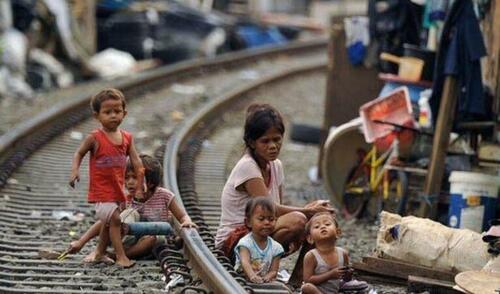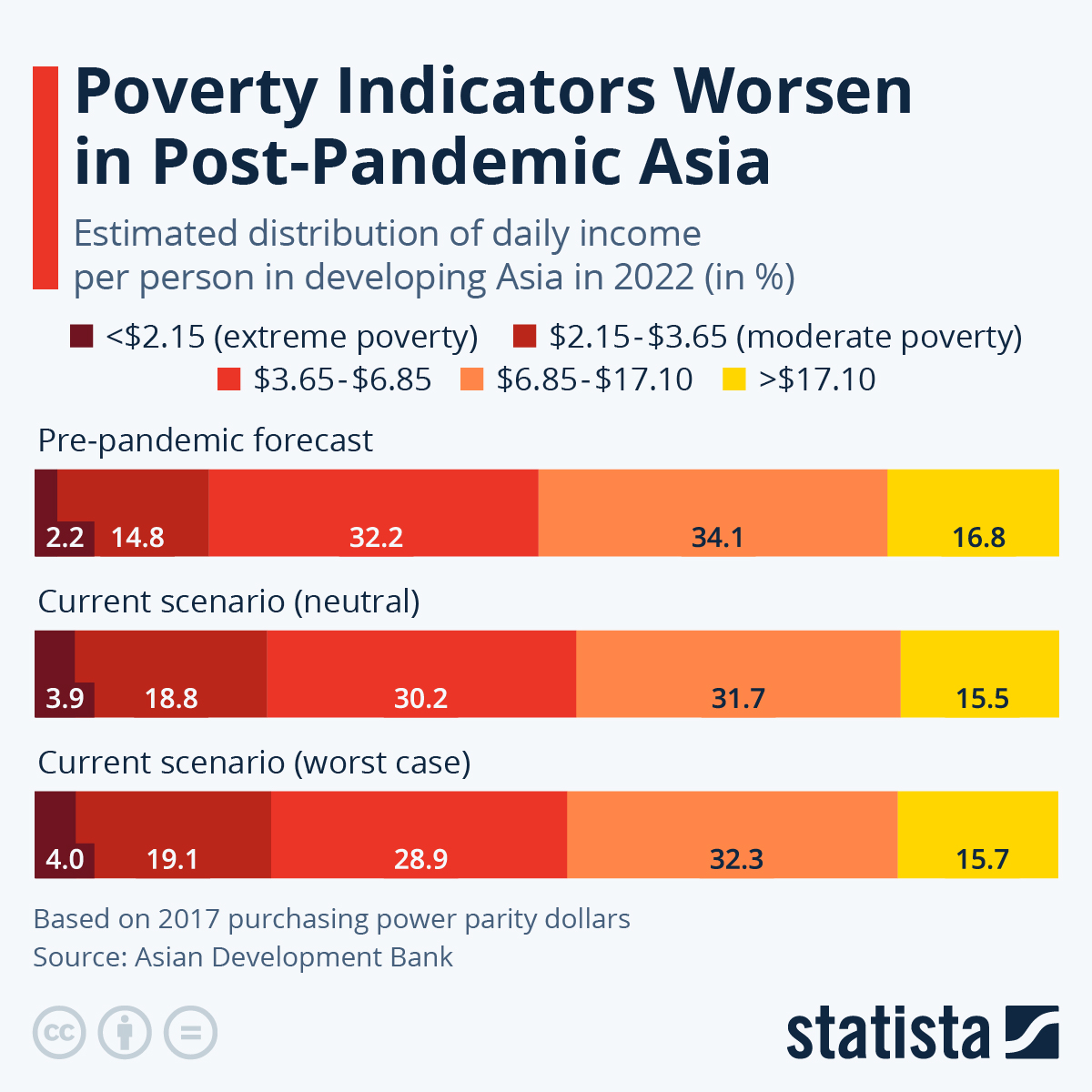
The share of people in developing Asia who live in extreme and moderate poverty is estimated to be higher now than 2022 predictions from before the pandemic had suggested.
As Statista's Katharina Buchholz reports, according to a new report by the Asian Development Bank, only 2.2 percent of people in the region were supposed to live in extreme poverty in 2022, defined as having less than $2.15 at their disposal in a day. However, the institution estimates that last year between 3.9 and 4.1 percent or around 155 million people were actually existing below this international poverty line. With moderate poverty also estimated to be around 4 percentage points higher than the forecast, poverty affected more than 20 percent of developing Asia last year despite hopes of more progress having been made at this point.
You will find more infographics at Statista
According to the report, the pandemic and the subsequent inflation crisis that took a turn for the worse with Russia's invasion of Ukraine have hit poorer people around the world especially hard. While social protections can mitigate such crises and help lift people out of poverty, less than half of the population in 26 Asian economies, including developed ones, was covered by any social benefits in 2020. The slowing down of poverty eradication in the current crisis scenario is now making the UN sustainable development goal of ending extreme poverty by 2030 more elusive.
Many of the people in poverty in developing Asia live in some of the continent's most populous nations, namely India, Pakistan and Bangladesh, which had extreme poverty rates between 13.5 percent and 4.9 percent as of the latest available data. Other countries with high (relative) numbers of extreme poverty in Asia were Laos, Nepal and Tajikistan. Data for Turkmenistan and Uzbekistan has not been published in at least 20 years, but numbers were also among the world's highest then.
Despite being home to many of Asia's poorest due to its population size, the fight against poverty has generally been successful in Pakistan previous to the pandemic and the current crisis. The country almost halved the share of its people living below the poverty line between 2010 and 2018 to around 5 percent. India cut poverty back from 22.5 percent in 2011 to 10 percent in 2019. The Philippines even lowered the number of those existing below the poverty line from 11.3 percent in 2009 to 3 percent in 2021 while Indonesia achieved a decrease from 18.3 percent in 2010 to 2.5 percent in 2020.
Yet, going the last mile to zero extreme poverty might prove equally hard for these countries as for those which haven't made as much progress, including Laos, Tajikistan and Bangladesh.
The share of people in developing Asia who live in extreme and moderate poverty is estimated to be higher now than 2022 predictions from before the pandemic had suggested.
As Statista’s Katharina Buchholz reports, according to a new report by the Asian Development Bank, only 2.2 percent of people in the region were supposed to live in extreme poverty in 2022, defined as having less than $2.15 at their disposal in a day. However, the institution estimates that last year between 3.9 and 4.1 percent or around 155 million people were actually existing below this international poverty line. With moderate poverty also estimated to be around 4 percentage points higher than the forecast, poverty affected more than 20 percent of developing Asia last year despite hopes of more progress having been made at this point.
You will find more infographics at Statista
According to the report, the pandemic and the subsequent inflation crisis that took a turn for the worse with Russia’s invasion of Ukraine have hit poorer people around the world especially hard. While social protections can mitigate such crises and help lift people out of poverty, less than half of the population in 26 Asian economies, including developed ones, was covered by any social benefits in 2020. The slowing down of poverty eradication in the current crisis scenario is now making the UN sustainable development goal of ending extreme poverty by 2030 more elusive.
Many of the people in poverty in developing Asia live in some of the continent’s most populous nations, namely India, Pakistan and Bangladesh, which had extreme poverty rates between 13.5 percent and 4.9 percent as of the latest available data. Other countries with high (relative) numbers of extreme poverty in Asia were Laos, Nepal and Tajikistan. Data for Turkmenistan and Uzbekistan has not been published in at least 20 years, but numbers were also among the world’s highest then.
Despite being home to many of Asia’s poorest due to its population size, the fight against poverty has generally been successful in Pakistan previous to the pandemic and the current crisis. The country almost halved the share of its people living below the poverty line between 2010 and 2018 to around 5 percent. India cut poverty back from 22.5 percent in 2011 to 10 percent in 2019. The Philippines even lowered the number of those existing below the poverty line from 11.3 percent in 2009 to 3 percent in 2021 while Indonesia achieved a decrease from 18.3 percent in 2010 to 2.5 percent in 2020.
Yet, going the last mile to zero extreme poverty might prove equally hard for these countries as for those which haven’t made as much progress, including Laos, Tajikistan and Bangladesh.
Loading…






